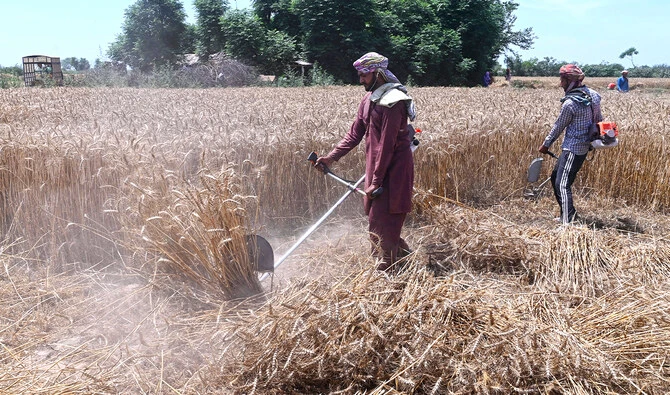Pakistan could face over 5m ton wheat shortage next year: Report

Stay tuned with 24 News HD Android App

Pakistan could face a wheat shortage of more than five million tons next year due to decrease in the crop sowing area and production, according to provincial government estimates.
Economists and food security experts say any such situation will strain the economy and lead to inflation.
In Pakistan, wheat is a staple food and its shortage can lead to political unrest and protests against the government. Pakistan, a country of 241 million, is expected to face a wheat shortfall of 5.66 million tons next year. As a consequence, it would have to spend foreign exchange to import wheat to fulfill the local demand.
This year, the Pakistani government allowed the private sector to import over three million tons of wheat to overcome shortages. In reaction, tens of thousands of farmers staged protests in several cities against the government’s decision not to buy their wheat, causing them huge financial losses.
The government routinely purchases around 20 percent of all the wheat produced by local farmers at a fixed price to ensure price stability, prevent hoarding, and maintain the supply chain. However, it lowered its purchase target to two million tons from around six million tons this year, with farmers in Punjab, the country’s largest wheat producer, asking the authorities to stop imports and purchase the commodity from them at the minimum support price fixed officially.
“The provinces have come up with a lower sowing area and production target of wheat for the next year, therefore the country will face a shortage of the commodity,” Arab News quoted Yasir Shakeel, a deputy director at Ministry of National Food Security and Research, as saying. “The provincial governments have been taking measures to achieve the sowing and production targets of wheat to fulfill the local need.”
Shakeel said the Federal Committee on Agriculture had set a wheat production target of 33.58 million tons from target area of 10.368 million hectares for 2025-26 based on national requirement for the produce to attain self-sufficiency.
“According to provincial governments’ proposals the target area for wheat will be 9.263 million hectares with production of 27.92 million tons,” he said.
The official said the Indus River System Authority’s advisory committee has anticipated a shortage of water to the extent of about 16 percent for Punjab and Sindh during the winter crop season, running from October to April, which could impact the wheat production along with other crops.
Farmers on the other hand have urged the government to announce a minimum support price of over Rs4,500 per 40 kilogram to encourage their community to sow the crop to achieve the government’s production target.
Khalid Bath, President of the Kissan Ittehad, a farmers’ association, told Arab News: “There are still 15 to 20 days before the wheat sowing season concludes, so the government’s intervention at this stage may help encourage farmers sow the crop instead of looking for the alternatives.”
As per the Kissan Ittehad estimates, the wheat sowing area can drop more than 30 percent this year compared to the previous year due to the Punjab administration’s policy of reducing the procurement target.
Dr. Abid Qaiyum Suleri, food security expert, said the farmers had not received a fair price for their cash crop, adding they were short of investments to sow the wheat crop on a large area.
“Farmers are looking for substitutes to earn profits on their crops as the government is apparently not willing to announce the minimum support price for the next year’s crop,” he told Arab News. “This will definitely lead to food shortages in the country, and the private sector will have a role to play to import the product to meet the local demand.”
Asif Arsalan Haider, a senior economist, maintained Pakistan’s inflation rate was heavily influenced by the agricultural products in the country, pointing out that wheat shortage would have a major impact on it.
“Pakistan’s rural economy is dependent on agriculture,” he said. “Therefore, farmers may face hardships if the government does not procure their produce at a fixed price.”
“The government should come up with a long term agricultural policy instead of resorting to stopgap arrangements each year,” he added.
